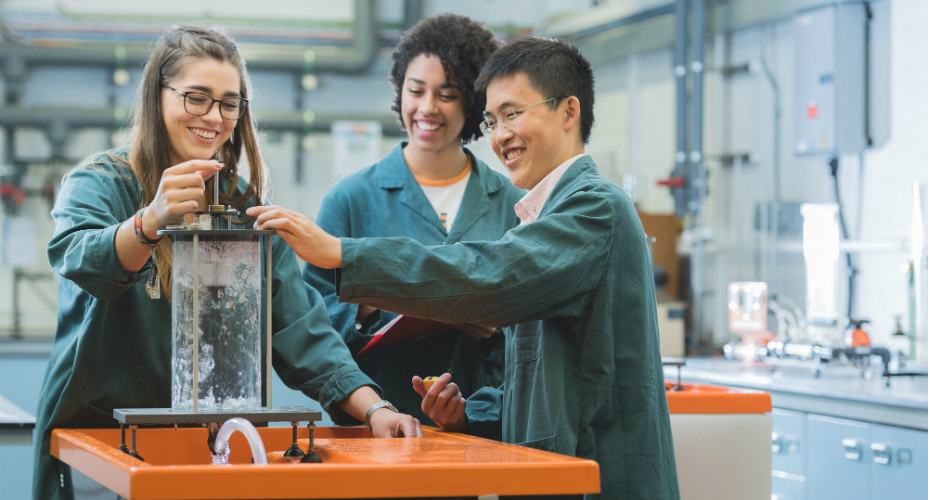Engineering

Engineering combines science, creativity and critical thinking to solve significant challenges in society. Whether that's finding new and innovative ways to deal with the increasing demand on energy and electricity with minimum impact on the environment, creating new materials with properties which unlock new design possibilities for products, or using simulation and optimisation to improve the efficiency of processes in industry.
The ever-changing nature of the modern world presents an infinite number of exciting challenges and opportunities for the next generation of engineers to address. Working at the forefront of scientific knowledge, it will be these engineers' responsibility to advance every field of human endeavour, through constant exploration and innovation.
This unique subject activity strand provides an insight into how that process might begin, offering an unrivalled opportunity to engage with world-leading experts in the field, exploring new ideas and technologies and testing these through hands-on experimental approaches. Ultimately, this programme will provide participants with a true understanding of what it means to be a 21st century engineer.
| Day | Date | Time | Location | |
|---|---|---|---|---|
| 1 | Wednesday | 12th February 2025 | 11.00 - 15.00 | Streatham campus, Exeter |
| 2 | Monday | 31st March 2025 | 11.00 - 15.00 | Streatham campus, Exeter |
| 3 | Thursday | 24th April 2025 | 11.00 - 15.00 | Penryn campus, Cornwall |
| 4 | Thursday | 29th May 2025 | 11.00 - 15.00 | Penryn campus, Cornwall |
| 5 | Tuesday | 3rd June 2025 | 11.00 - 15.00 | Streatham campus, Exeter |
| 6 | TBC | September 2025 | 11.00 - 15.00 | Field trip, from Streatham campus, Exeter |
Activity locations
Subject activity sessions will take place on the University of Exeter Streatham campus (three sessions) and the Penryn campus (two sessions), with the exception of one field trip (Leave from Streatham Campus).
Session 1: Standard introductory session (Streatham)
- Date: Feb (4 hours) TBC
- Content:
- Introduction to programme and department
- Ice breakers and group activities
- Campus tour
- Q&A
- Leads: WPC, ESA and academic (Tim Holsgrove has previously given department intro)
Session 2: Mechanical workshop and Bioengineering session (Streatham)
- Date: March (4 hours) TBC
- Content:
- Split students into two groups and rotate through 2 activities
- Mechanical workshop tour
- Bioengineering seminar
- Leads: Brendan Corkery (technical, Mechanical Workshop), Roger Perret
Session 3: Renewables hydrogen fuel cell academic session (Penryn)
- Date: April
- Content:
- Introduction to Renewables
- ESA Q&A
- ESA Penryn campus tour
- Hydrogen fuel call activity (2-3 hours)
- Leads: Adam Feldman (academic, fuel cell activity)
Session 4: Wind turbine build project session (Penryn)
- Date: May (4 hours) TBC
- Content:
- Introduction to turbine blades
- Balsa wood turbine build in REEF
- Leads: Phil Nesbitt (technical), JPaul Taylor (technical), Philipp Thies (academic) or if Philipp unavailable Jack Corbin (PGR)
Session 5: MakerSpace workshop and CAD session (Streatham)
- Date: June (4 hours)
- Content:
- MakerSpace Lolly tower build
- CAD computer session
- Leads: Roger Perrett (technical, MakerSpace), Dong Wang (academic, CAD)
Session 6: V simulator, Science Park
- Date: July TBC
- Content:
- Travel to/from campus ( Streatham)
- Leads: Katy Manning/James Bassett
Other possible session content:
- SpacePort on campus session, (david.pollard@spaceportcornwall.com)
- ASK study skills session Penryn, Elizabeth Wragg (FXplus)
- ASK study skills session Streatham, John Shanahan (Staff)
This subject activity strand has contributions from the following degree programmes:
- BEng Engineering
- BEng Renewable Energy Engineering
Priority will be given to applicants studying A-Level Mathematics.
In order to pass the programme, you must attend a minimum of 5 out of 6 subject activity sessions, as well as the Exeter Scholars Student Conference.



